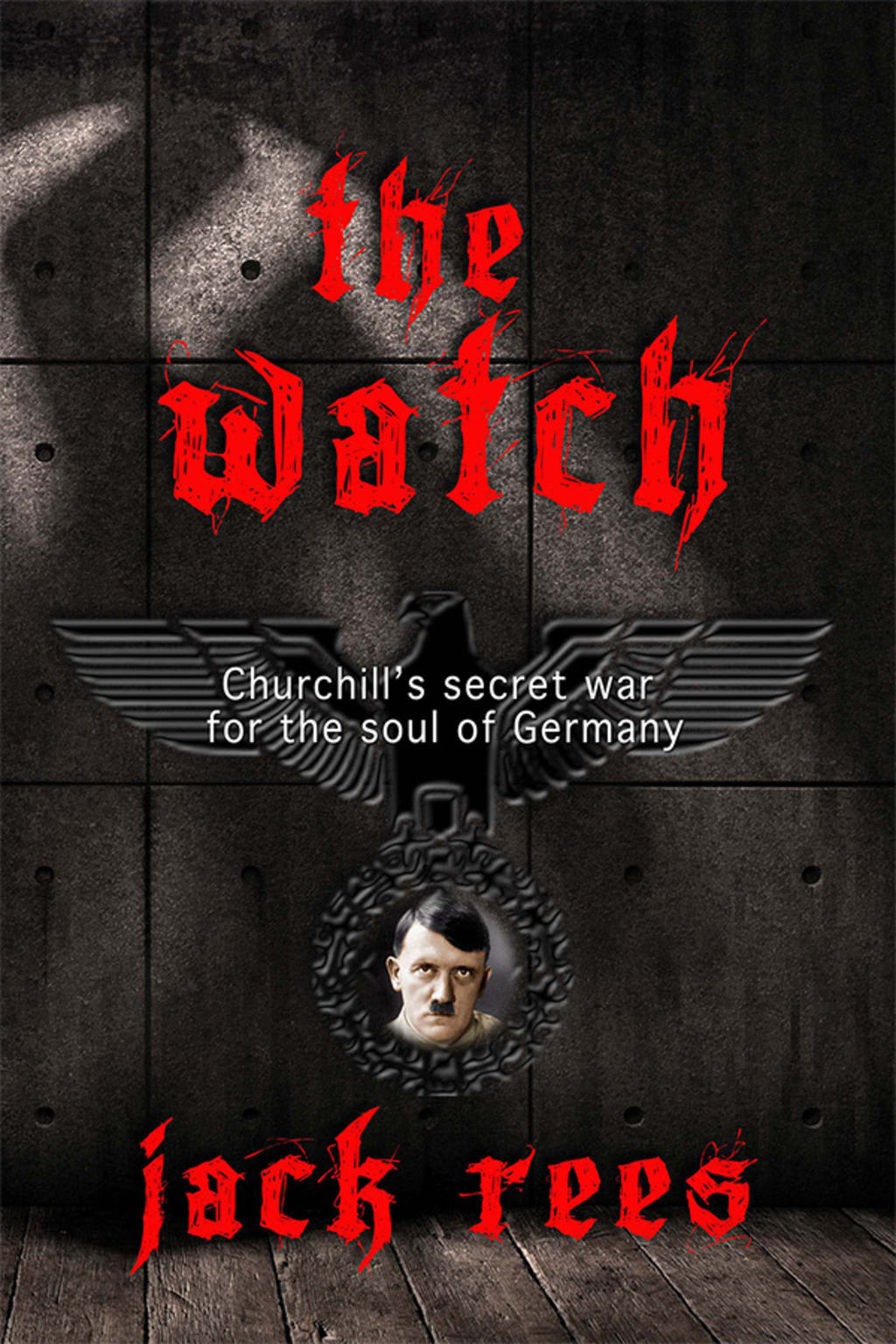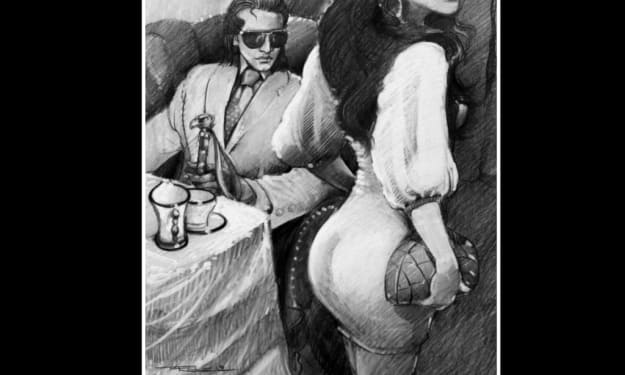The Watch
4: Saturday, January 3rd, 1903 Linz, Austria: Herr Schickelgruber.

It was a curse. This deep, smoldering anger that colored every moment and every action of the day and night, every thought, even his dreams. It was like, he thought, a deep underground fire of the kind that spends years eating away at a coal mine, bursting to the surface now an then in flames to be extinguished or at least dampened down, only to appear somewhere else on the landscape days, weeks, even years later. Alois Schickelgruber could not remember a day in his entire life when the anger was not there. But then, there was never a day when there was not a reason to be angered.
He well remembered the childhood days of crushing poverty, the sick young woman he married for her dowry and the lust that drove him to others. Women, a necessary evil! A man must be cared for, a man has needs, and in Government service he must even have an image. Schicklgruber tapped the cane alongside the calf of his leather boot, picturing in his mind the trashing he would love to give a few of his superiors in the Austrian Customs Service. These pigs with their degrees, their society marriages and fine homes! He struck his boot harder, delighting in the crack of the cane against the stiff leather.
Schiklgruber was a self-made man. Without an education or a degree he had schemed, politicked and ass-kissed his way up to a higher rank in the service than anyone with his roots had achieved before. He knew he was worthy or more, but nothing he had tried had worked. From the very day he had left the broken down home in rural Strones, he had started scheming. He married Anna, years his senior at 50, for her money. She was frail then and under his ‘care’ she soon became an invalid confined to a lonely sickbed in her room. Then he hired Klara. She was 16, a child still, the daughter of a distant step-uncle, the brother of the man Heidler who married his mother long after he was born – yet refused to legitimize him. He cracked the cane against the boot once more. He enjoyed raping her. He smiled as he recalled the expression on his step-uncle’s face as he handed Alois the bank draft from his dead step-father’s estate. The wrangling over the will had gone on for years.
Finally, Alois had gathered several cronies in the customs service and convinced the parish priest at Dollersheim to change his birth records. His last name now became Hiedler, the dying wish of his ‘loving’ stepfather. His cronies agreed to witness the claim in front of the priest. With the parish records in his hands he threatened trouble if the bulk of Heidler’s estate was not handed over to him. He paid off his friends handsomely. He did it for the money, but the name was useful too. Schiklgruber was a country bumpkin name that tied him to a bunch of hapless peasants back in Strones. Hiedler was a city name, better for an up and coming Customs official. His lip curled as he recalled the day the official record arrived in the post. Some idiot civil servant had misread the priest’s arrogantly minimal handwriting. Now his last name was Hitler.
He thrashed Klara mercilessly for that, had sex with her, and still was angry. When Anna finally died, a very carefully managed process of gradual starvation, he married Klara. She was thoroughly cowed, she knew her lot was inescapable, and now whipping her with the cane was almost without pleasure.
He finally retired from the Customs Service, there was nowhere higher to go, that was clear. The dreams of great rewards for excellent service as a high government official had turned to schietze. He had enough money to buy a farm, the Rauscher Gut at Hafeld, near Linz. He planned to tend his bees and pass time with other local landed gentry. That dream turned to scheitze too. The nine acres required too much of his own effort, the house was crumbling, the entire estate a financial mess.
He heard the latch click on the back kitchen door below. His heart quickened and he swung up in the chair, easing his boots off the desktop in front of him. Adolf was home from school. Eleven year old Adolf. His lip curled once more as he gripped the rounded end of the cane in his hand. Alois Jr. was his bastard son from an affair before Klara. He was the oldest and had left the family as soon as he was able. There was another bastard from the same affair, Angela, who wisely kept to herself. Klara had spawned her share of brats. Gustav was almost a bastard, born five months after they were married, the product of the first time he raped Klara. Ida was born a year later. Then came Adolf, then Otto. Otto turned out to be a runt. He died a few months after he was born. No loss there. Gustav and Ida died of diphtheria. Edmund was born next, then Paula, the last of Klara’s output. Edmund died of measles.
It looked good to the service to be a man with a substantial family…that plan had turned to schiezte as well. So, it was up to Adolf. He had thought, at one time, that he might groom Adolf for the Customs Service or some other Government post. Get him educated, get him a degree, get him to a place in Government that would finally show his superiors the stuff the father was made of. But Adolf was surly and intransigent. Adolf seemed to resent the beatings his Mother received; he seemed not to want to understand the need and purpose for correction. Over time, the boy would knowingy thwart his Father’s plans and deliberately seek the very opposite path to the ones his Father favored.
Well, now Adolf would get his beating too. The following day, Alois Schiklgruber-Hitler left the house. He re-lived the beatings of the day before and soon he was sweating, worn out. He headed for the GastHaus Steifler, a few miles down the road from the farm. The beating had not gone well. At fourteen Adolf was not a big child. He could not fight off his father or the cutting slashes of the wickedly thin cane.
Alois re-lived the beating in his mind again. It was usually a source of pleasure, but this time the visions made the anger rise to his very back teeth. The boy had just stared at him. Stared with those palest of blue, cold and resentful eyes. He flinched to be sure as the cane slashed at his calves, his buttocks and his back through the thin, grubby grey flannel shirt. There was no pleasure in flinching. No, it was screams Alois wanted to hear. Screams and cries for mercy, for forgiveness. The pleas would be ignored, the thrashing would continue as long as it produced screams. Only when the screams subsided to moans or senseless silence, and only then, did the beating end. He slammed open the door of the Gasthaus, and likewise the door to the private bar. The waiter hurriedly poured a glass of red wine and placed it on the small table in front of the green leather wing chair that groaned as Alois dropped his weight into it.
“Paper, Herr Hitler?” The waiter offered the Linzer Volksblat as Alois looked up, wine glass halfway to his grimacing mouth. It was at that moment that the taste in the back of his mouth seemed to turn to pain instead. It was now a searing pain in his lungs. He dropped the wineglass and coughed, then looked dumbly at the blood that spewed over his waistcoat and the green leather tabletop. The waiter pulled the paper back, as if to spare the next customer a blood spattered read. Alois began to fall forward; he noticed the headline that, in the understated style of the Linzer Volksblat reported that the German Kaiser was railing against Austria’s failure to curb Hungarian dissidents. Strange, thought Alois, the facts of seeming importance in the last second’s of his life were, in truth, so inconsequential. He wished he could beat Klara once last time.
Half an hour later Herr Doktor Liebermann attended to the corpse. There was nothing to be done. He had known Hitler from the time he had first bought the farm at Hafeld. He had often secretly attended to the wounds of Klara and the children as they grew.
Liebermann stared now at the open eyes of the bloodied brute in front of him. He bent forward and stared closer still.
He whispered into the ear of the corpse, "Has the anger finally died, Herr Schickelgruber?"
Author Note: This account of Adolf Hitler's youth is based on recorded memories. Hitler's own accounts given in Mein Kampf differ greatly and for propaganda purposes only.
Next Post: 5: Tuesday, November 11th, 1902 San Gabriel, Ca: The Birthday Party.
About the Creator
Mark Newell
Mark Newell is a writer in Lexington, South Carolina. He writes historical action adventure, science fiction and horror. These include one published novel, two about to be published (one gaining a Wilbur Smith award),and two screenplays.






Comments
There are no comments for this story
Be the first to respond and start the conversation.